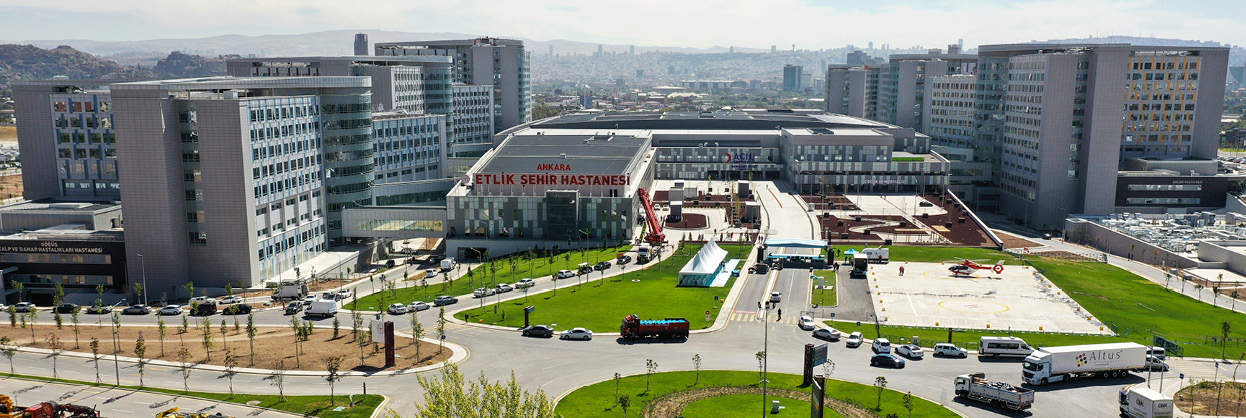ANKARA ETLIK CITY HOSPITAL

A case study on MOBATIME Master Clock System solution deployed at City Hospital located in the Etlik neighbourhood of Ankara, Turkey.
Ankara Etlik City Hospital is an Integrated Healthcare Complex located in the center of the capital city Ankara, in the Etlik district, on a 1,022,000 m² area. It consists of eight different specialized hospitals, a main hospital with diagnostic and treatment areas, a Radiotherapy Building, a Medical Observation Clinic, an Administrative Building, a Conference Center, Parking Buildings, and Technical Buildings.
With a capacity of 4,050 beds, 1,000 outpatient clinics, 125 operating rooms, 691 intensive care beds, 9865 car parking, 4 helipad and a total closed area of 1,145,129 m², the aim of this healthcare facility is to provide healthcare services at the highest level while ensuring the comfort, safety, and privacy of patients and staff.
MOBATIME'S PROPOSAL FOR THE HOSPITAL
The project was a big challenge in terms of system capacity and complexity. But MOBATIME was ready with its reliable and best fit solution.
- The Master clock system at Etlik City Hospital consists of Primary and secondary NTP servers DTS 4132.timeservers, operating in Active-Active redundant mode to synchronize the entire infrastructure to a common source, providing time and date information to all IT systems / network clients and various slave clocks installed throughout the hospital infrastructure.
- TREND analogue clocks, deployed at Patient Rooms, Offices are installed in single sided version whereas at Corridors, Halls, and Lobbies in double sided version (1'850 pieces were used).
- ECO-DC digital clocks, deployed at Patient Rooms, Offices and at the Operating rooms to be used as countdown Timer / stopwatch display (900 pieces were used).
- A supervision and management software, MOBA-NMS Pro for administration and supervision of complete system centrally.
The Etlik City Hospital is a prime example of the implementation of synchronized time data, which is crucial in various aspects of hospital operations.
First of all, patient safety plays a central role. Precisely synchronized clocks ensure that medical staff administer medicines and treatments at the right time, minimizing the risk of errors. This precision is also essential for clinical coordination. In a hospital, different departments and staff need to coordinate their activities seamlessly. Whether it's surgery, diagnostic tests or patient transfers, precise timings prevent delays and confusion.
In emergency situations, timing is critical. Synchronized clocks enable rapid response to emergencies such as code blue alarms or activation of rapid response teams, potentially saving lives. In addition, accurate time stamps on medical records are essential for legal compliance and billing accuracy. They facilitate medical audits and insurance claims.
In terms of infection control, synchronized clocks help maintain hygiene standards by setting strict timings for tasks such as hand washing and sterilization. Workflow efficiency is also improved, resulting in shorter waiting times for patients and better use of resources. In surgical procedures, synchronization ensures that procedures start and end on time, reducing the risk of prolonged operations and complications.
Timely administration of medication is critical for patients. Accurately displayed times help healthcare providers stick to medication schedules and avoid missed doses. In laboratories, synchronized clocks are essential for coordinating sample collection, processing and reporting. This helps maintain the integrity of diagnostic tests.
Compliance with many health regulations and accreditation standards requires precise timelines. Compliance with these standards is necessary for the hospital's legal and financial standing. In modern healthcare systems, precise time synchronization facilitates data integration between different hospital systems and devices, improving the interoperability of electronic health records (EHRs) and medical devices.
With the growth of medicine and remote patient monitoring, synchronized time ensures that data transmission and coordination between healthcare providers and patients is accurate. Hospitals, including Etlik City Hospital, often rely on synchronized time for communication purposes, whether it is for coordinating shift changes among nursing staff, scheduling meetings or conducting case reviews.
In summary, synchronization and accurate timings in a hospital setting are fundamental to patient safety, clinical coordination, workflow efficiency, regulatory compliance and the overall quality of healthcare services. Hospitals, especially Etlik City Hospital, rely on accurate timings to ensure that medical procedures, records and patient care activities are carried out with precision and reliability.
Additional there are many more aspects like Patient safety, Clinical Coordination, Workflow Efficiency, Surgical Procedures, Laboratory Testings and Data integration.
WORK COMPLETION: 8 MONTHS
COST OF WORK: CHF 400K